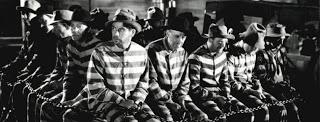 I Am a Fugitive from a Chain Gang (1932) is a bleak, uncompromising treatment of systemic injustice. Mervyn LeRoy boldly exposes the prison system's cruelty, daring to posit that such aren't uncommon.
I Am a Fugitive from a Chain Gang (1932) is a bleak, uncompromising treatment of systemic injustice. Mervyn LeRoy boldly exposes the prison system's cruelty, daring to posit that such aren't uncommon.James Allen (Paul Muni) returns from World War I with few prospects. He resigns a dull office job and travels the country finding more challenging work. He's mistakenly arrested for a robbery and condemned to ten years on a chain gang. Allen escapes and becomes a construction engineer, until his wife (Glenda Farrel) turns him into the police. James becomes a cause celebre, but grows tired of waiting for the System to clear him.
Made at the height of the Great Depression, Chain Gang embodies its era's pervasive anger. James is a war hero who finds civilian life unfulfilling; abandoning his parents and a stable job lands him in trouble. His scenes of vagrancy prove palpable even before he's arrested; LeRoy shows the Other America in unvarnished fashion as pitiable yet unromanticized, awash in crime and betrayal. Once entered, things only get worse.
Chain Gang draws on a true story, allowing LeRoy and writers Howard J. Green and Brown Holmes to dwell on penal cruelty. Prisoners are manacled and forced into hazardous work, treated as brute labor without rights or protection. Officials elongate sentences to keep laborers on staff, selling out to private contractors. The movie acknowledges that the overwhelming majority of workers are black; James' case is unique only because he's white. Such crooked prison farms are sadly making a comeback, making the film more pertinent than ever.
Chain Gang bleakly frames an unforgiving system. James can't overcome his false conviction, further damning himself with escape attempts. He turns himself in to ensure leniency, only to receive an enhanced sentence. Efforts to free him drag on, leaving James in a bureaucratic limbo. It's like the Universe punishes him for abandoning bourgeois conformity; escaped, he's trapped into a loveless marriage dissolved by his fling with Helen (Helen Vinson). It's a bold inversion of the standard Hollywood morality play, an innocent condemned by nonconformity.
Paul Muni scored his breakthrough with Scarface that same year, but he's even better here. Muni often relied on disguises and makeup but fares better with physicality, confusion and anguish. He's a rough character who's flawed but retains our sympathy; it takes a tough guy to survive James' ordeal. Muni gets emotional speeches and action scenes, along with a haunting exit as he backs into the dark, condemning himself to oblivion.
I Am a Fugitive from a Chain Gang has aged well, both for its dramatic power and for its continued relevance. The Hays Code prevented movies from achieving such subversive anger for decades, channeling social justice into neutered message movies.

